
Is Your Heart with the Underdog? Good. You Should Root for Amazon
5 minutes. No warnings.
It's a bit counter-intuitive, I know. Amazon is huge. Amazon is not a sympathetic figure. Amazon is a soulless corporate giant, crushing the small bookseller beneath its heel.
But let's look closely at the anti Amazon sentiment from publishers and bookstores, and then look at how we, as readers and authors, should react.
I'm not just a casual observer on this. I've been an avid reader my whole life, I've been a lover of bookstores, and most recently, an author with a fairly successful book.
I've also always been in the corner of the little guy, and enjoyed eeing the world's Davids stand up to the world's Goliaths. As a card carrying member of the unwashed masses, my heart always been with the underdog.
So why, then, do I cheer for Amazon? Amazon is by no measure know to man an underdog.
Because Amazon is the only place that gives underdogs a fair shot.
However they try to spin it, bear in mind that the big publishers are no underdogs either. They've dictated terms for authors and readers for years, and now that they are losing that position of power, they aren't happy. Well, ice house owners weren't happy about people buying refrigerators either, but keeping humanity in the dark ages to protect your monopoly isn't exactly a holy and righteous crusade.
From my own experience as a new author, I can say that I've done far better going through Amazon than I would have through a traditional publisher. In the first six weeks of my latest novel being out, I've sold 1700 Kindle e-books, which net me $2.74 each. And that book has driven sales of my first book, pushing out another 250 over the trickle it had been selling. So I've already earned the mean advance for a new s/f author while retaining complete control of my book, picking my own cover, making my own marketing choices and not giving up a single right. I retain foreign rights, film rights, the works.
I didn't go it totally alone. I had help from the Firedance writers' collective. You do need a decent editor and proofreader and designer and a cover artist to make a book look professional, but it's not rocket science or alchemy like the big publishing houses would have you believe. A good group of writers can band together and make it happen. My books have gotten glowing reviews on the editing as well as the writing, and I'd put them up against anything from a major publishing house for finish and quality.
So, point Amazon. More money, more control, less selling out. All authors should like that.
OK, I hear you protest, Amazon might not be the villain in the war with publishers, but what about the local bookstore?
This is tough. I love a good bookstore. I feel for them. I want to be in their corner.
But let me relate my experience as a local author getting into bookstores.
I call local bookstores, tell them I'm a local author with a new book that I think will appeal to their customers. Roughly half the time, I'm told that the person I need to talk to isn't there, and will call me back.
Bookstore owners never call back. I love them, I understand they are busy, but they never, ever, ever call back.
So I call again. Eventually, I do talk to somebody who can help me. Most of the time, they are happy to put my books in the store. But they don't want to just order them from the distributor. They will, however, take a few copies on consignment. Which means I order copies, put them in my car, drive out to the store and give them some books.
Now, selling on consignment means I leave empty handed. When the books sell, the owner will call and let me know and then I'll get a check for my cut of the retail price (generally 60%)
Except, as mentioned above, the owner never calls. Anyone. Ever.
Yeah, running a bookstore is a lot of work. These guys are busy. I get that. So I call and check in every month or so. And eventually, they say "Oh, yeah. We did sell those. We'll take three more copies if you want. Drive out and I'll write you a check."
So, once more, I order copies and deliver them, burning time and fuel, and get a check for 60% of the cover price of three books.
If I break even, I'm doing very well.
In contrast, yesterday, while I did work in my yard, Amazon sold 28 copies of my books. Multiply that by $2.74 and I made $76.72, with no cost in fuel or time or shipping. Effectively, I got paid for work I'd done on a book last year while I did household chores that I'd have had to put off if I were delivering books hither and yon for a fraction of that payout.
So, while I do actually like the small, local bookstores, and will probably keep supplying them with books, because I believe in the personal touch they provide, the economics do not justify it. I don't know how bookstores can change their business model to compete, and I'd like to see them survive, but if I want to earn an income writing, I can't hitch my wagon to them.
So, as an author without a whole lot of name recognition, I love Amazon. My alternative is a basement full of books, sacrificing my scant days off schlepping them around New England to drop them off in handfuls and waiting months for a return.
That's an independent bookstore. Don't even bother trying to get into a major chain. The manager at your local Barnes and Noble won't take your books or plan a signing. You will be referred to the company's buyer. While I'm sure I could move some books locally, books written by somebody who grew up in town, books with a lot of regional references and connections, impressing a buyer at a national chain is a different ball of wax, and not worth the effort.
As a reader I love Amazon. I have access to any book in print, shipped to my door or delivered to my device. There's no real way a physical store can compete with that. Not on price or inventory anyway. The advantages they do have would be author events, local authors, community outreach. That's where they have the edge over a virtual store. But I don't see a lot of that, and it's not easy to get them to stock your books or host a signing. So I think I'll just let the Amazon royalties roll in while I work on the sequel, and order books people recommend from the comfort of my own home when I need a break from writing.
So Amazon might not be the underdog, but Amazon is the best friend an underdog ever had.
Books by Patrick LeClerc
Immortal Vagabond Healer Series
Book 1
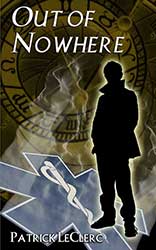
Sean Danet is immortal—a fact he has cloaked for centuries, behind enemy lines and now a paramedic’s uniform. Having forgotten most of his distant past, he has finally found peace. But there are some things you cannot escape, however much distance you put behind you.
Buy NowBook 2
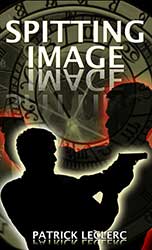
Immortal Sean Danet can heal others with a touch. Finally, after too long as a rootless vagabond, he has found a place he feels he belongs, with friends he can trust and the love of an intelligent, beautiful woman. The life he dreamed of but never expected to attain.
Buy NowShort Historical Adventures
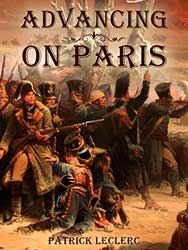
One of the problems with being immortal is you get to live through all of history's most famous blunders. Like Napoleon's inspired idea for a land war in Asia. If you love historical military fiction, action and adventure, or just one of the sexiest urban fantasy heroes of all, Advancing on Paris is a must.
Buy NowMore Great Fiction from Patrick LeClerc

Semper Fidelis. The motto of the United States Marine Corps. On the ragged edges of civilization, Corporal Michael Collins has lived those words, taking on riots and evacuations, rebels and terrorists. Asteroid belt patrol is just another deployment. Ninety nine percent boredom, one percent terror.
Buy Now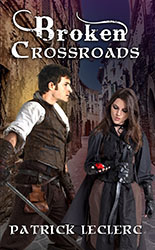
The city of Laimrig, once a mighty hub of commerce and a seat of power sinks into corruption and decay. Slavers, crime lords and corrupt officials hold sway while the ruling nobility wallow in decadence. War rages beyond the borders, while within rebellion simmers and sinister plots unfold.
Buy Now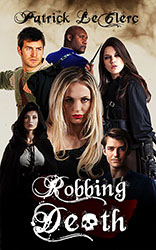
Trilisean is an acrobat turned burglar. Conn is a jaded former mercenary. Against the background of deadly blades, subtle schemes, glittering treasures, and dark sorceries, fate has thrown them together.
And fate has a sense of humor.
Buy Now